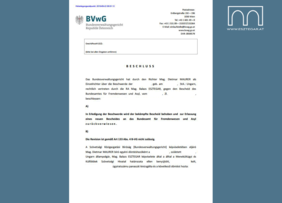The complainant is a Hungarian citizen and is married to an Austrian citizen, with whom she also lives in Austria. The complainant's spouse suffers from a serious illness and is unable to engage in gainful employment as he has to undergo treatment in hospital several times a week. He is dependent on the support of his spouse for everyday activities.
The complainant first applied for a registration certificate, whereupon the Federal Office for Immigration and Asylum initiated a procedure under section 55 (3) Immogration Act (NAG) to review the conditions for residence under EU law and subsequently - without addressing the complainant's circumstances and her spouse's need for care - issued a decision requiring the complainant to leave the territory of the Republic of Austria within one month of the decision becoming final.
The complainant, who was represented by lawyer Balazs Esztegar, appealed against this decision to the Federal Administrative Court, arguing that the Federal Office for Immigration Law and Asylum had not addressed the family situation of the complainant and her spouse at all, let alone her spouse's need for care.
The Federal Administrative Court upheld the appeal, annulled the decision of the Federal Office for Immigration and Asylum and removed the applicant's expulsion from Austria. The Federal Administrative Court judged the procedure of the Federal Office for Immigration and Asylum to be "deficient in essential points" and stated, among other things that
the authority had completely failed to investigate the complainant's family and private life in Austria, although it knew that she was married to an Austrian citizen and that the latter was obviously already in retirement due to ill health and was receiving care allowance and compensatory allowance.
According to section 9 of the BFA-VG, the authority was obliged to make findings on the family environment. Furthermore, it was stated that
the facts referred to by the authority concerned, which result from the file situation, lack a necessary topicality which would make a valid conclusion regarding the complainant appear comprehensible.
The Federal Administrative Court therefore considered the facts relevant to the decision, which had been ascertained by the authority, to be deficient with regard to Art 8 ECHR and section 9 BFA-VG and saw the authority's actions as a violation of the authority's duty to investigate as determined in section 37 in conjunction with section 39 para 2 of the Administrative Procedure Act (AVG).





